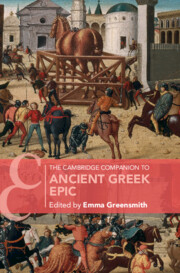Book contents
- The Cambridge Companion to Ancient Greek Epic
- The Cambridge Companion to Ancient Greek Epic
- Copyright page
- Contents
- Figures
- Contributors
- Preface
- Introduction
- Part I Epic Engagements
- Part II Epic Space
- Part III Epic Time
- 8 A Brief History of Epic Time
- 9 Time and Again
- 10 Trojan Temporality in Imperial Greek Epic
- Part IV Epic People
- Part V Epic Feelings
- Part VI Epic Without End
- Epilogue
- Timeline of Ancient Greek Epic
- Bibliography
- Index Locorum
- Subject Index
- Cambridge Companions To Literature
10 - Trojan Temporality in Imperial Greek Epic
from Part III - Epic Time
Published online by Cambridge University Press: 04 December 2024
- The Cambridge Companion to Ancient Greek Epic
- The Cambridge Companion to Ancient Greek Epic
- Copyright page
- Contents
- Figures
- Contributors
- Preface
- Introduction
- Part I Epic Engagements
- Part II Epic Space
- Part III Epic Time
- 8 A Brief History of Epic Time
- 9 Time and Again
- 10 Trojan Temporality in Imperial Greek Epic
- Part IV Epic People
- Part V Epic Feelings
- Part VI Epic Without End
- Epilogue
- Timeline of Ancient Greek Epic
- Bibliography
- Index Locorum
- Subject Index
- Cambridge Companions To Literature
Summary
This chapter considers the prominence of and play with temporality in imperial Greek epic through a reading of three poems which thematise time in particularly self-conscious ways: Quintus of Smyrna’s Posthomerica, Triphiodorus’ Sack of Troy and Colluthus’ Abduction of Helen. These epics all return directly to the world of Troy, resurrect Homer’s idiolect and style, and locate their plots before or in-between the timespan of the Iliad and Odyssey. Analysing some key moments of temporal reflexivity in these poems, the chapter outlines the specific ‘imperial Greek temporality’ that they share, which connects these otherwise very different poems and renders them distinct from, for instance, Apollonius’ Alexandrian epic as analysed by Phillips. These poets proudly return to the literary distant past and use this past to convey their own imperial identities, revelling in their paradoxical positions as both pre- and post-Homeric.
- Type
- Chapter
- Information
- The Cambridge Companion to Ancient Greek Epic , pp. 204 - 228Publisher: Cambridge University PressPrint publication year: 2024

